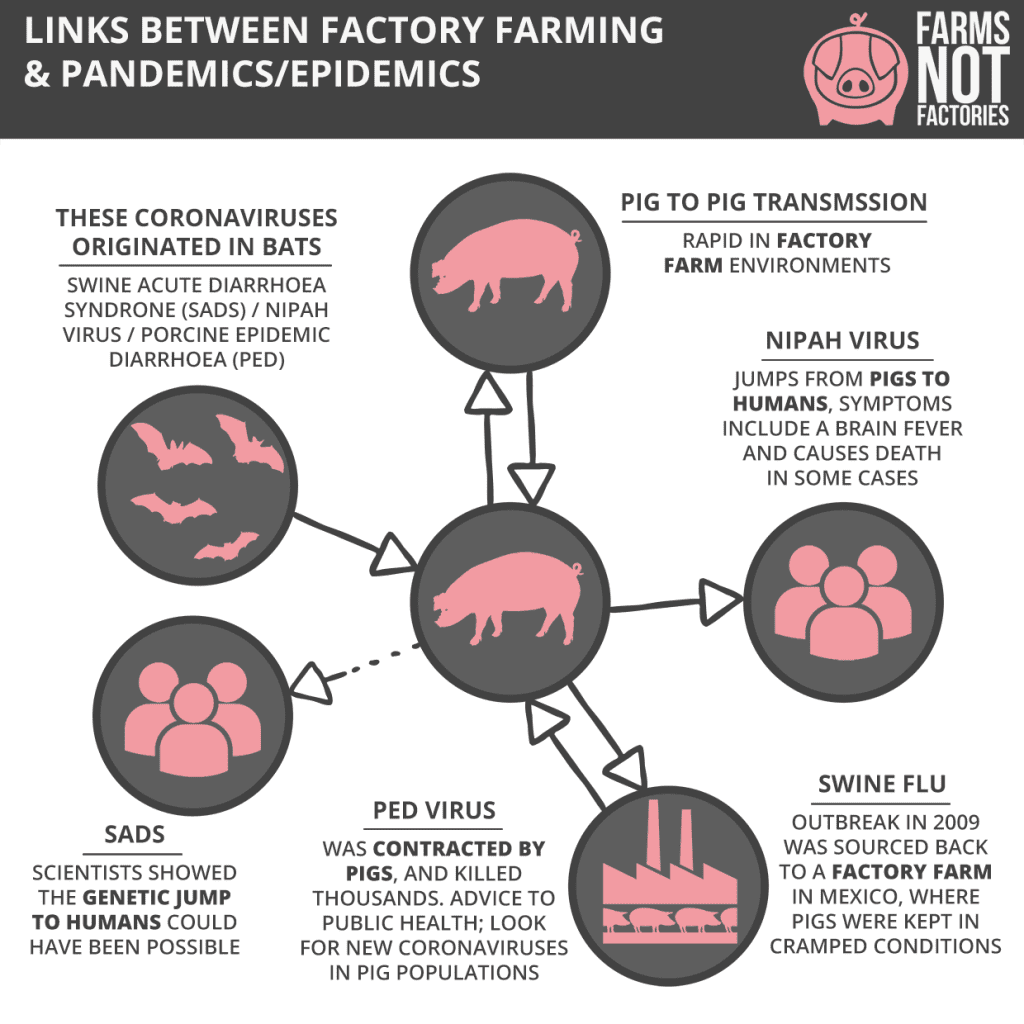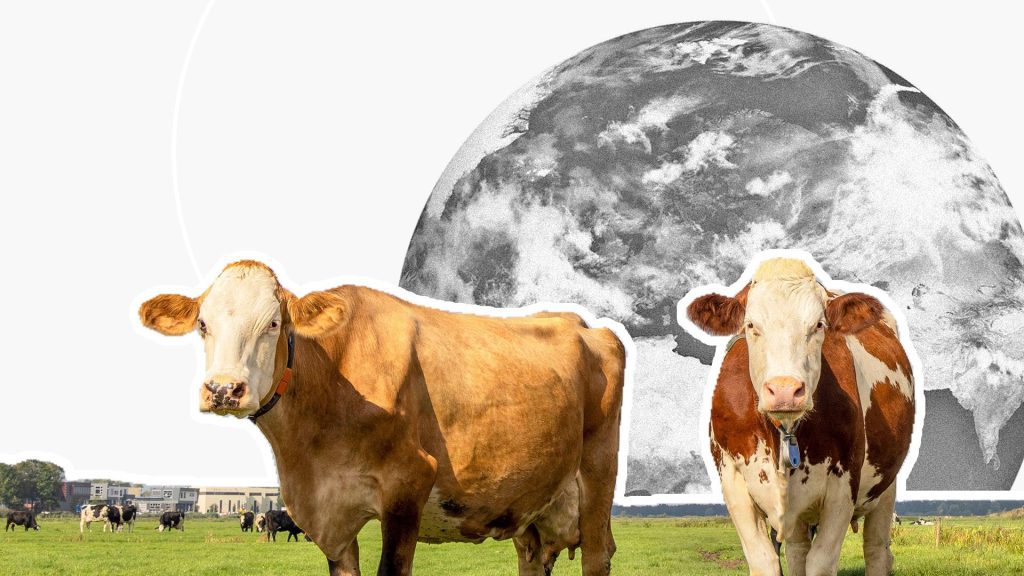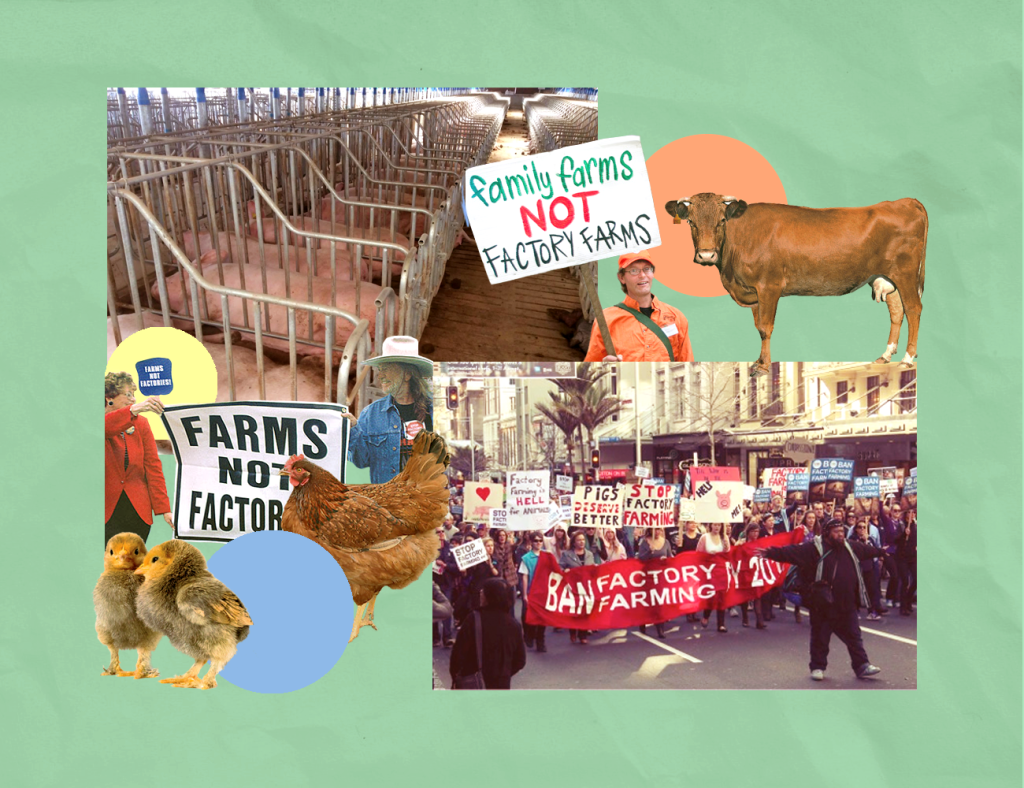Silav, hezkiriyên heywanan û hevalên hawirdorparêz! Îro, em ê bikevin nav mijarekê ku dibe ku ne pir xweş be ku meriv nîqaş bike, lê yek ji wan pir girîng e: çandiniyên kargehê. Ev operasyonên mezin ne tenê li ser hilberîna xwarinê di pîvanek mezin de ne - ew di belavkirina nexweşiyan û çêkirina wêraniyê li ser jîngehê de rolek girîng dilîzin. Werin em aliyê tarî yê çandiniya kargehê û çima çareserkirina van pirsgirêkan girîng e, bikolin.

Veguhestina Nexweşiyan li Çandiniyên Kargehê
Yek ji fikarên sereke yên li ser zeviyên kargehê ev e ku ew çawa dikarin bibin navendên çandina nexweşiyan. Vê xeyal bikin: heywan di cîhên teng de bi hev re kom dibin, ku ev yek dibe sedema belavbûna nexweşiyan mîna agirê daristanan pir hêsan. Nêzîkbûn û şert û mercên stresdar pergalên wan ên parastinê qels dikin, wan bêtir ji nexweşiyan re hesas dikin. Ev yek, di encamê de, xetera veguhestina nexweşiyan di nav heywanên di nav zeviyê de zêde dike.
Tiştê ku hîn bêtir xemgîn dike, zêdebikaranîna antîbiyotîkan li zeviyên kargehê ye. Ji bo pêşîgirtina li nexweşiyan di jîngehên ewqas qerebalix de, pir caran heywan bi antîbiyotîkan têne pompkirin. Lêbelê, ev pratîk bûye sedema zêdebûna bakteriyên ku li hember antîbiyotîkan berxwedêr in, ku dermankirina enfeksiyonan hem li heywanan û hem jî li mirovan dijwartir dike. Ew çerxek xerab e ku ji bo tenduristiya giştî gefek cidî çêdike.
Û em nexweşiyên zoonozîk ji bîr nekin - ew kêzikên nebaş ên ku dikarin ji ajalan derbasî mirovan bibin. Ji ber ku gelek ajalan li yek cîhekî ne, îhtîmala belavbûna van nexweşiyan bo karkerên çandiniyê û civakên nêzîk pir zêdetir e. Ew bombeyeke demkî ye ku em nikarin paşguh bikin.

Çawa Em Gihiştin Vir
Çandiniya heywanan a pîşesaziyê, ku bi sedan an jî bi hezaran heywan di cihên teng û qerebalix de têne girtin, ji bo belavbûna bilez a nexweşiyên vegirtî hawîrdorek îdeal diafirîne. Dema ku heywan di bin şert û mercên stresdar û neasayî de ewqas nêzîk têne girtin, ji bo nexweşiyan derbasbûna ji kesekî bo kesekî din pir hêsantir dibe. Her çend gelek nexweşiyên vegirtî tenê di nav heywanan de belav dibin jî, hin ji wan xwedî şiyana derbasbûna mirovan in. Ev nexweşî, ku wekî zoonoz an nexweşiyên zoonotîk têne zanîn, ji bo tenduristiya giştî xetereyên bêhempa û cidî çêdikin.
Dibe ku hûn bi hin nexweşiyên zoonotîk ên hevpar ên wekî grîpa berazan, salmonella, û MRSA (Staphylococcus aureus-aureus-a berxwedêr a methicillin) nas bin. Ev nexweşî nîşan didin ka çawa patojenên ku ji heywanan çêdibin dikarin bandorê li mirovan bikin, carinan dibin sedema şewbên berfireh an enfeksiyonên giran. Veguhestina nexweşiyan ji heywanan bo mirovan bi taybetî tirsnak e ji ber ku pergalên me yên parastinê yên mirovan - û dermanên ku niha li ber destê me ne - dibe ku ji bo naskirin an şerkirina bi bandor a van mîkrobên nû ne amade bin.
Pandemiya COVID-19, ku ji ber vîrûseke zoonozîk çêbûye, nîşan da ku civaka me ya cîhanî çiqas li hember nexweşiyên nû yên ji çavkaniyên heywanan derdikevin xeternak e. Her çend COVID-19 rasterast bi çandiniya heywanan a pîşesaziyê ve ne girêdayî bû jî, ew wekî hişyariyek bihêz li ser xetereyên ku ji hêla zoonozan ve têne çêkirin û encamên potansiyel ên wêranker ger em belavbûna wan kontrol nekin, xizmet kir. Vê pandemiyê hewcedariya lezgîn a têgihîştina çêtir a nexweşiyên zoonozîk, xurtkirina pergalên tenduristiya me û bicîhanîna tedbîrên ku xetera şewbên pêşerojê kêm dikin, destnîşan kir.
Bi kurtasî, çandiniya heywanan a pîşesaziyê di afirandina şert û mercên guncaw ji bo derketin û belavbûna nexweşiyên zoonotîk de roleke girîng dilîze. Naskirina vê girêdanê pir girîng e ger em dixwazin tenduristiya mirovan biparêzin, pêşî li pandemiyên pêşerojê bigirin û ji bo nifşên pêşerojê civatek berxwedêrtir û ewletir ava bikin.
Bandorên Tendurustî û Jîngehê yên Çandiniya Kargehê
Çandiniya kargehê, ku wekî çandiniya heywanan a tund jî tê zanîn, bandorên kûr li ser tenduristiya mirovan û jîngehê dike. Ev rêbaza pîşesazî ya xwedîkirina heywanan ji bo zêdekirina hilberîn û karîgeriyê hatiye sêwirandin, lê pir caran bi lêçûnek girîng ji bo pergalên ekolojîk û refaha giştî. Li jêr, em encamên sereke yên tenduristî û jîngehê yên bi çandiniya kargehê ve girêdayî vedikolin.

Bandorên Tenduristiyê
a. Belavbûna Nexweşiyên Zoonozîk
Çandinîyên kargehê ji bo derketin û veguhestina nexweşiyên zoonotîk - nexweşiyên ku ji ajalan derbasî mirovan dibin - şert û mercên îdeal diafirînin. Populasyonên ajalên bi dendika bilind belavbûna bilez a patojenan hêsan dikin, ku hin ji wan dikarin mutasyon bikin û şiyana vegirtina mirovan bi dest bixin. Mînakî, înfluenza çûkan, înfluenza berazan û bakteriyên berxwedêr ên antîbiyotîkê yên wekî MRSA ne. Ev nexweşî dikarin bibin sedema belavbûnên herêmî an pandemîyên gerdûnî, wekî ku di COVID-19 de tê dîtin.
b. Berxwedana Antîbiyotîkan
Bikaranîna rûtîn a antîbiyotîkan li zeviyên kargehê ji bo pêşvebirina mezinbûnê û pêşîgirtina li nexweşiyan di şert û mercên qerebalix de, bi girîngî beşdarî krîza cîhanî ya berxwedana antîbiyotîkan bûye. Bakteriyên ku rastî van antîbiyotîkan tên, pêş dikevin û berxwedanê pêş dixin, û dermankirina enfeksiyonên di mirovan de dijwartir dike. Ev berxwedan bandora dermanên jiyanrizgarker tehdît dike û li çaraliyê cîhanê xetereyek mezin a tenduristiya giştî çêdike.
c. Nîgeraniyên Ewlehiya Xwarinê
Rêbazên çandiniya kargehê ji ber gelek faktorên bi hev ve girêdayî yên ku di hilberîna heywanan a pîşesaziyê de hene, xetera nexweşiyên ji xwarinê derbas dibin bi girîngî zêde dikin. Yek ji fikarên sereke îhtîmala zêdebûna qirêjbûnê ji hêla mîkroorganîzmayên nexweşî yên wekî Salmonella , Escherichia coli (E. coli), û Campylobacter , ku hemî sedemên sereke yên nexweşiyên ji xwarinê derbas dibin li çaraliyê cîhanê ne.
Li çewlikên kargehê, ajal pir caran di hawîrdorên pir qerebalix û teng de têne bicihkirin, ku ev yek veguhestina bilez a patojenan di nav ajalan de hêsan dike. Ev qerebalixî ne tenê ajalan dixe bin stresê - pergalên wan ên parastinê qels dike û wan ji enfeksiyonan re bêtir hesas dike - lê di heman demê de qirêjbûna fekal a qadên jiyanê jî zêde dike. Şert û mercên weha ji bo zêdebûna bakteriyên zirardar rezervuarek îdeal diafirînin.
Herwiha, pratîkên paqijî û paqijiyê yên nebaş di dema xwedîkirin, veguhastin û serjêkirina heywanan de metirsiya qirêjbûnê zêdetir dikin. Mînakî, paqijkirina nebaş a tesîs, alav û wesayîtên veguhastinê dikare bihêle ku bakterî berdewam bikin û belav bibin. Di dema serjêkirin û hilberandinê de, heke laş bi rûberên qirêj re bikevin têkiliyê an jî heke karker protokolên paqijiyê yên hişk bişopînin, qirêjbûna xaçerê dikare çêbibe.
Nexweşên wekî Salmonella û Campylobacter bi taybetî di nav mirovan de cihê fikaran digirin ji ber ku ew bê nîşane rêça rûvî ya gelek ajalên çandiniyê dagir dikin, ev tê vê wateyê ku ajalan saxlem xuya dikin dema ku bakteriyên vegirtî dihewînin. Dema ku ev bakterî goşt, şîr, an hêkan qirêj dikin, ew dikarin di mirovan de bibin sedema nexweşiya gastrointestinal a giran. E. coli , nemaze celebên enterohemorrajîk ên wekî O157:H7, toksînên bihêz çêdikin ku dikarin bibin sedema îshala xwînî, sendroma uremî ya hemolîtîk (HUS), û tewra têkçûna gurçikan, nemaze li zarok, kal û pîr û kesên lawaz ên pergala parastinê.
Bandora nexweşiyên ji xwarinê tên û bi çandiniya fabrîkî ve girêdayî li ser barê tenduristiya giştî girîng e. Li gorî Rêxistina Tenduristiyê ya Cîhanê (WHO), nexweşiyên ji xwarinê tên her sal bandorê li bi sed mîlyonan kesan dikin, û dibin sedema nexweşî û mirinan. Nexweşxane û mirin pir caran di nav nifûsên xeternak de, wek zarokên piçûk, jinên ducanî, mezinên pîr û kesên ku pergalên wan ên parastinê lawaz in, çêdibin.
Herwiha, ji ber bikaranîna berfireh a antîbiyotîkan di çandiniya kargehan de, her ku diçe celebên van patojenên ku li hember antîbiyotîkan berxwedêr in, têne ragihandin. Ev yek dermankirin û başbûna ji enfeksiyonên ji xwarinê çêdibin tevlihev dike, dibe sedema nexweşiyên dirêjtir, lêçûnên lênihêrîna tenduristiyê yên zêde, û xetereyên bilindtir ên encamên giran.
Bandorên Jîngehê
a. Emisyonên Gazên Serayê
Çandiniya ajalan, bi taybetî çandiniya fabrîqeyî, beşdarê sereke yê belavbûna gazên serayê ye, di nav wan de metan (CH4), nîtrojen oksît (N2O), û karbondîoksît (CO2). Metan, ku ji hêla helandina heywanên riwekan û birêvebirina zibilê ve tê hilberandin, bi taybetî di girtina germê di atmosferê de bi bandor e. Ev belavbûn bi girîngî beşdarî germbûna gerdûnî û guherîna avhewayê dibin.
b. Qirêjî û Bikaranîna Avê
Çewlikên kargehê gelek bermayiyên ajalan çêdikin, ku pir caran xurekên wekî nîtrojen û fosfor, nexweşîyên mîkrobî û antîbiyotîk dihewînin. Avêtina nerast û herikîna ji golên gubreyan dikare avên rûyê erdê û avên binê erdê gemarî bike, bibe sedema ewtrofîkasyonê, geşbûna algayan û xirabûna ekosîstemên avî. Wekî din, çandiniya kargehê xerckerek giran a çavkaniyên avê ye, ku pirsgirêkên kêmbûna avê li gelek herêman girantir dike.
c. Xirabûna Erdê û Birîna Daristanan
Daxwaza ji bo berhemên xwarinê yên wek soya û ceh ji bo domandina çandiniyên kargehê dibe sedema darbirrîna daristanan a di asta mezin de û veguherandina erdê, nemaze li herêmên tropîkal ên wekî daristana Amazonê. Ev dibe sedema windabûna biyolojîk, erozyona axê û têkçûna pêvajoyên veqetandina karbonê. Wekî din, çêrandina zêde û zêde bikaranîna erdê ji bo hilberîna xwarinê dibe sedema hilweşîna axê û çolbûnê.
Rewşên Nexweşiyan li Çandiniyên Kargehê
Ji ber zêdebûna heywanan, şert û mercên stresdar û tedbîrên nebaş ên ewlehiya biyolojîk, çewlikên kargehê gelek caran wekî navendên belavbûna nexweşiyan hatine destnîşankirin. Hevgirtina van faktoran veguhestina bilez û zêdebûna ajanên enfeksiyonê hêsan dike, ku hin ji wan bûne sedema fikarên tenduristiyê yên herêmî û cîhanî.
Ji ber zêdebûna heywanan, şert û mercên stresdar û tedbîrên nebaş ên ewlehiya biyolojîk, çewlikên kargehê gelek caran wekî navendên belavbûna nexweşiyan hatine destnîşankirin. Hevgirtina van faktoran veguhestina bilez û zêdebûna ajanên enfeksiyonê hêsan dike, ku hin ji wan bûne sedema fikarên tenduristiyê yên herêmî û cîhanî.
1. Înfluenzaya Çûkan (Grîpa Çûkan)
Yek ji mînakên herî navdar ên belavbûna nexweşiyan li fermên kargehê înfluenzaya çûkan e. Li gorî Rêxistina Tenduristiyê ya Cîhanê (WHO) û Rêxistina Xurek û Çandiniyê (FAO), vîrusên înfluenzaya çûkan a pir patogen (HPAI), wek H5N1 û H7N9, li fermên mirîşkên giran ên li çaraliyê cîhanê gelek şewb bûne sedema. Ev şewb ne tenê ji ber qirkirinê dibin sedema windahiyên mezin ên aborî, lê di heman demê de gefek rasterast a zoonozîk li ser mirovan jî çêdikin. Şert û mercên xanî yên qerebalix li fermên kargehê rê li ber belavbûna bilez a vîrusê vedikin, di heman demê de mutasyonên di genoma vîrusê de xetera enfeksiyona mirovan zêde dikin. WHO bi berdewamî li ser potansiyela pandemîk a vîrusên înfluenzaya çûkan ên ku ji jîngehên fermên kargehê derdikevin hişyarî daye.
2. Vîrusa Înfluenzaya Berazan û Îshala Epîdemîk a Berazan (PEDV)
Çandiniya berazan a dijwar her wiha bi belavbûna dubare ya vîrusên înfluenzaya berazan ve girêdayî ye, ku carinan dikarin derbasî mirovan bibin, wekî ku di pandemiya înfluenzaya H1N1 a 2009an de hate dîtin. Navendên Kontrol û Pêşîlêgirtina Nexweşiyan (CDC) radigihînin ku zeviyên berazan, nemaze yên ku hewakirina wan nebaş e û dendika wan a heywanan zêde ye, pêşveçûn û ji nû ve komkirina vîrusên înfluenzayê hêsan dikin, û xetera derketina holê ya cureyên nû zêde dikin. Bûyerek din a girîng ku bi zeviyên berazan ên kargehê ve girêdayî ye vîrusa îshala epidemîk a berazan (PEDV) ye, ku nifûsa berazan li seranserê Amerîkaya Bakur û Asyayê wêran kiriye û zirara aborî ya berfireh çêkiriye.
3. Tuberkuloz û Bruseloza Ga
Çandiniya kargehê ya pez bûye sedema belavbûna nexweşiyên zoonotîk ên wekî tûberkuloza pez (bTB) û bruseloz. Rêxistina Cîhanî ya Tenduristiya Heywanan (WOAH, berê OIE) şert û mercên qerebalix û nepaqij wekî faktorên sereke yên ku veguhestina Mycobacterium bovis (ajana sedema bTB) û Brucella . Ev nexweşî ne tenê tenduristiya heywanan tehdît dikin, lê dikarin bi têkiliya rasterast an vexwarina berhemên şîr ên nepasterîzekirî mirovan jî vegirin.
4. Staphylococcus aureus a li hember Methicillin Berxwedêr (MRSA)
Jîngehên çandiniya pîşesaziyê wekî rezervuarên bakteriyên berxwedêr ên antîbiyotîkê yên wekî MRSA hatine destnîşankirin. Lêkolînên ku di kovarên wekî The Lancet Infectious Diseases , hebûna şaneyên MRSA yên bi ajalan ve girêdayî di çandiniyên kargehê de destnîşan dikin, ku dikarin li karkerên çandiniyê û civaka berfirehtir belav bibin. Bikaranîna xelet û zêde ya antîbiyotîkan di çandiniya kargehê de ji hêla WHO ve wekî ajokarên sereke yên berxwedana antîmîkrobî têne nas kirin, ku vebijarkên dermankirinê ji bo enfeksiyonên hem ajalan û hem jî mirovan tevlihev dike.
Ev rewş pêwîstiya krîtîk a ji bo reformkirina pratîkên çandiniya fabrîkî û baştirkirina çavdêriya nexweşiyan û tedbîrên ewlehiya biyolojîk nîşan didin. Dersên ji şewbên berê hatine girtin divê rêberiya polîtîkayan bikin da ku xetera şewbên pêşerojê kêm bikin û hem tenduristiya giştî û hem jî refaha heywanan biparêzin.
Hewldanên ji bo Çareserkirina Pirsgirêkan
Bi xêra Xwedê, hewl hene ku pirsgirêkên girêdayî çandiniyên kargehê çareser bikin. Rêzikname û polîtîkayên ku armanca wan baştirkirina refaha heywanan û kêmkirina bandora li ser jîngehê ye, li gelek welatan têne bicîhanîn. Ev tedbîr di berpirsiyarkirina çandiniyan û pêşvebirina pratîkên domdartir de pir girîng in.
Li ser asta takekesî, xerîdar dikarin bi hilbijartina piştgiriya pratîkên çandiniyê yên domdar cûdahiyek çêbikin. Bi hilbijartina hilberên ji çavkaniyên etîkî û hawîrdorparêz, em dikarin peyamek bihêz ji pîşesaziyê re bişînin. Ew hemî li ser hişyariya li ser xwarina me ji ku tê û bandora wê li ser tenduristiya me û gerstêrkê ye.
Di dawiyê de, aliyê tarî yê çandiniya fabrîkî nayê paşguh kirin. Belavbûna nexweşiyan, xirabûna jîngehê û bandorên aborî nîşanên zelal in ku guhertin bi lezgînî hewce ye. Bi bilindkirina hişmendiyê, piştgirîkirina alternatîfên domdar û kirina hilbijartinên agahdar wekî xerîdar, em dikarin bibin alîkar ku pergalek xwarinê ya exlaqîtir û hawîrdorparêztir were afirandin. Werin em bi hev re ji bo pêşerojek tenduristtir ji bo hemî hebûnên li ser vê gerstêrkê bixebitin!

Ji bo Bidawîkirina Çandiniya Kargehê Tevger Bikin
Delîlên zêde yên encamên zirardar ên tenduristî, jîngehî û exlaqî yên çandiniya fabrîkî pêwîstiya lezgîn a bi çalakiya kolektîf destnîşan dikin. Çareserkirina vê pirsgirêkê hewceyê hewldanên hevrêzkirî ji siyasetmedaran, beşdarên pîşesaziyê, xerîdaran û komên parêzvaniyê dike da ku pergalên xwarinê yên me veguherînin modelên domdartir û mirovanetir. Li vir stratejiyên sereke hene ku guhertinek watedar bimeşînin:
1. Reforma Siyasetê û Rêzikname
Divê hikûmet rêziknameyên hişktir li ser başiya heywanan, karanîna antîbiyotîkan û qirêjiya jîngehê ya bi çandiniya fabrîkî ve girêdayî bicîh bînin û bicîh bînin. Ev yek danîna sînorên bicîhanîn li ser dendika heywanan, qedexekirina karanîna antîbiyotîkan a rûtîn ji bo pêşvebirina mezinbûnê, û ferzkirina çavdêriya zelal a pratîkên rêveberiya bermayiyan vedihewîne. Piştgiriya qanûnên ku pratîkên çandiniyê yên alternatîf û domdar pêşve dixin jî pir girîng e.
2. Pêşvebirina Çavkaniyên Proteînê yên Alternatîf
Kêmkirina daxwaza berhemên heywanên ku li kargehan tên çandin bi rêya teşwîqkirina pejirandina parêzên li ser bingeha nebatan û teknolojiyên nû yên wekî goştê çandinî dikare bi girîngî pîvana çandiniya heywanên pîşesaziyê kêm bike. Hikûmet û sektorên taybet dikarin lêkolîn, pêşkeftin û gihîştina proteînên alternatîf teşwîq bikin da ku wan ji bo xerîdaran erzan û balkêş bikin.
3. Hişyarî û Parêzvaniya Xerîdaran
Xerîdarên agahdar xwedî hêzek girîng in ku bandorê li dînamîkên bazarê bikin. Kampanyayên perwerdehiya giştî li ser bandorên çandiniya fabrîkî û feydeyên hilbijartinên xwarinên domdar dikarin tevgera xerîdaran biguherînin. Piştgiriya destpêşxeriyên etîketkirinê yên wekî "pejirandî ji bo başiya heywanan" an "bê antîbiyotîk" alîkariya kirrûbiran dike ku biryarên berpirsiyar bidin.
4. Xurtkirina Çavdêrî û Lêkolîna Cîhanî
Veberhênan li sîstemên çavdêriyê ji bo tespîtkirina zû ya nexweşiyên zoonotîk ên nû û fînansekirina lêkolînên li ser girêdanên di navbera pratîkên çandiniyê û tenduristiya giştî de ji bo pêşîlêgirtinê pir girîng in. Hevkariya navneteweyî bi rêya rêxistinên wekî WHO, FAO, û WOAH dikare parvekirina zanînê û bersivên hevrêzkirî yên li hember gefên zoonotîk hêsan bike.















































